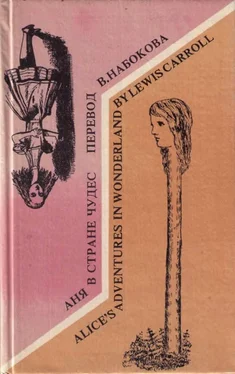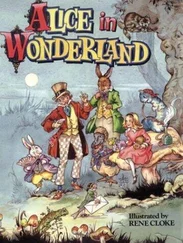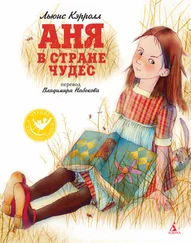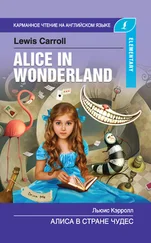'That depends a good deal on where you want to get to', said the Cat.
'I don't much care where' — said Alice.
'Then it doesn't matter which way you go', said the Cat.
'- so long as I get somewhere' , Alice added as an explanation.
'Oh, you're sure to do that, said the Cat, 'if you only walk long enough'.
Alice felt that this could not be denied, so she tried another question. 'What sort of people live about here?’
'In that direction, the Cat said, waving its right paw round, 'lives a Hatter: and in that direction, waving the other paw, 'lives a March Hare. Visit either you like: they're both mad'. [61] they’re both mad — в последующем эпизоде Кэрролл опирается на английские поговорки: «As mad as a hatter» и «As mad as a March hare». М. Гарднер отмечает, что обе поговорки имеют реальное основание. В XIX в. профессиональной болезнью шляпников было ртутное отравление — его вызывала ртуть, вплоть до недавнего времени использовавшаяся при обработке фетра, что нередко вело к судорогам и различным психическим расстройствам. Вторая из пословиц имеет, конечно, в виду безумные прыжки зайца-самца в марте, в период спаривания.
'But I don't want to go among mad people', Alice remarked.
'Oh, you can't help that, said the Cat: 'we're all mad here. I'm mad. You're mad'.
'How do you know I'm mad?’ said Alice.
'You must be, said the Cat, 'or you wouldn't have come here'.
Alice didn't think that proved it at all; however, she went on 'And how do you know that you're mad?’
'To begin with, said the Cat, 'a dog's not mad. You grant that?’
'I suppose so, said Alice.
'Well, then, the Cat went on, 'you see, a dog growls when it's angry, and wags its tail when it's pleased. Now I growl when I'm pleased, and wag my tail when I'm angry. Therefore I'm mad.
'I call it purring, not growling, said Alice.
'Call it what you like, said the Cat. 'Do you play croquet with the Queen today?’
'I should like it very much, said Alice, 'but I haven't been invited yet.
'You'll see me there, said the Cat, and vanished.
Alice was not much surprised at this, she was getting so used to queer things happening. While she was looking at the place where it had been, it suddenly appeared again.
'By-the-bye, what became of the baby?’ said the Cat. 'I'd nearly forgotten to ask'.
'It turned into a pig, Alice quietly said, just as if it had come back in a natural way.
'I thought it would, said the Cat, and vanished again.
Alice waited a little, half expecting to see it again, but it did not appear, and after a minute or two she walked on in the direction in which the March Hare was said to live. 'I've seen hatters before, she said to herself;’the March Hare will be much the most interesting, and perhaps as this is May it won't be raving mad-at least not so mad as it was in March. As she said this, she looked up, and there was the Cat again, sitting on a branch of a tree.
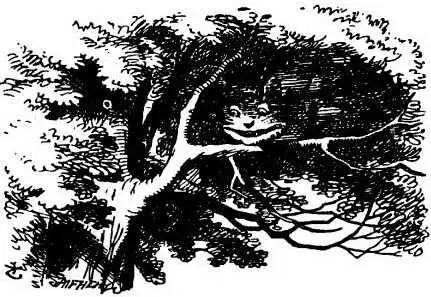
'Did you say pig, or fig?’ said the Cat.
'I said pig, replied Alice;’and I wish you wouldn't keep appearing and vanishing so suddenly: you make one quite giddy.
'All right, said the Cat; and this time it vanished quite slowly, beginning with the end of the tail, and ending with the grin, which remained some time after the rest of it had gone.
'Well! I've often seen a cat without a grin, thought Alice;’but a grin without a cat! It's the most curious thing I ever saw in my life!’
She had not gone much farther before she came in sight of the house of the March Hare: she thought it must be the right house, because the chimneys were shaped like ears and the roof was thatched with fur. It was so large a house, that she did not like to go nearer till she had nibbled some more of the lefthand bit of mushroom, and raised herself to about two feet high: even then she walked up towards it rather timidly, saying to herself 'Suppose it should be raving mad after all! I almost wish I'd gone to see the Hatter instead!’
There was a table set out under a tree in front of the house, and the March Hare and the Hatter were having tea at it: a Dormouse [62] Dormouse — «прототипом» Мыши-Сони был, возможно, ручной зверек — вомбат, принадлежавший английскому поэту и художнику Данте Габриэлю Россетти (1828–1882), имевший обыкновение спать у него на столе. Кэрролл знал семейство Россетти и порой навещал его. Сохранилось несколько фотографий Россетти и его семьи, выполненных Кэрроллом, который был выдающимся фотографом своего времени. Английская мышь-соня — грызун, живущий на дереве и более напоминающий маленькую белку, чем мышь. Зимой эти животные впадают в спячку. В отличие от белки сони — животные ночные, так что днем даже летом они спят.
was sitting between them, fast asleep, and the other two were using it as a cushion, resting their elbows on it, and talking over its head. 'Very uncomfortable for the Dormouse, thought Alice;’only, as it's asleep, I suppose it doesn't mind.
The table was a large one, but the three were all crowded together at one corner of it: 'No room! No room!’ they cried out when they saw Alice coming. 'There's plenty of room!’ said Alice indignantly, and she sat down in a large arm-chair at one end of the table.
'Have some wine, the March Hare said in an encouraging tone.
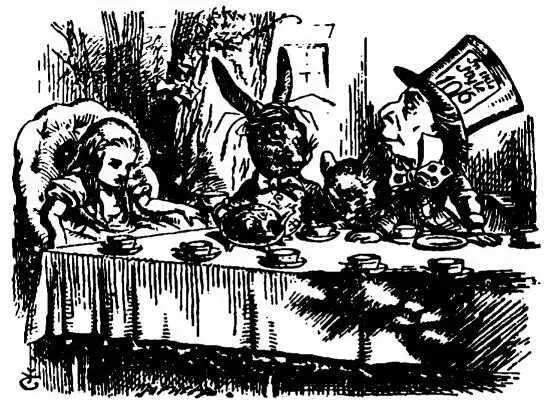
Alice looked all round the table, but there was nothing on it but tea. 'I don't see any wine, she remarked.
'There isn't any, said the March Hare.
'Then it wasn't very civil of you to offer it, said Alice angrily.
'It wasn't very civil of you to sit down without being invited, said the March Hare.
'I didn't know it was your table, said Alice;’it's laid for a great many more than three.
'Your hair wants cutting, said the Hatter. He had been looking at Alice for some time with great curiosity, and this was his first speech.
'You should learn not to make personal remarks, Alice said with some severity;’it's very rude.
The Hatter opened his eyes very wide on hearing this; but all he said was, 'Why is a raven like a writing-desk?’ [63] «Why is a raven like a writing-desk?» — загадка Шляпника вызывала споры во времена Кэрролла. В предисловии к изданию сказки 1896 г. он писал: «Enquiries have been so often addressed to me, as to whether any answer to the Hatter’s riddle can be imagined, that I may as well put on record here what seems to me to be a fairly appropriate answer, viz: ‘Because it can produce a few notes, they are very flat, and it is never put with the wrong end in front!’ This, however, is merely an afterthought; the Riddle, as originally invented, had no answer at all.»
Читать дальше
Конец ознакомительного отрывка
Купить книгу
